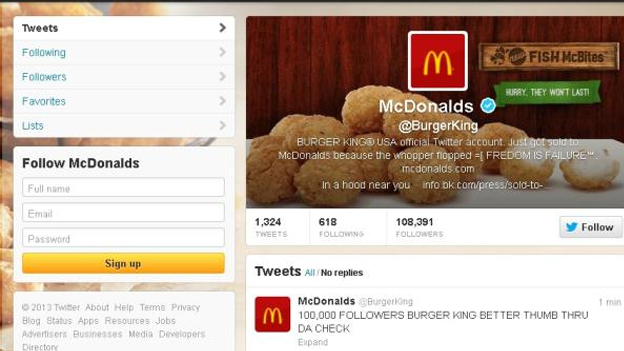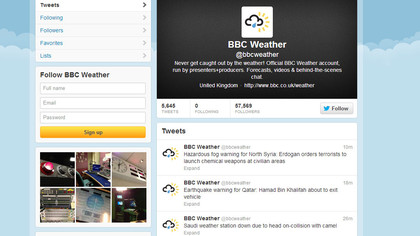Getting hacked - the best thing for your brand?
Hacktivists, you're shooting yourselves in the foot

I won't lie: I had a good laugh during the BBC Weather Twitter feed hack today. The account was hijacked by a pro-Syria group titled "Syrian Electronic Army", and though the underlying political issue certainly isn't so funny, the way in which the hacktivists made their move was pretty entertaining.
Over the course of an hour the cybergroup posted a number of faux weather warnings involving camel collisions and suchlike, which the BBC failed to notice for some time. Although they didn't get the spotlight, BBC Arabic and BBC Radio Ulster were also hijacked, though control was taken back a lot sooner on these channels.
The group's motivations were clear from the start: This was an attack to embarrass the BBC and take revenge for its reporting on the Assad regime, and though the "Syrian Electronic Army" might not be a name to rival Anonymous, they at least got their five minutes of soapbox fame.

But of course, the fun was soon over, and the BBC (eventually) removed the offending tweets and apologised for the momentary lapse of control. Service resumed as normal, except that the BBC had expanded its sphere of influence.
Before the hijack took place, the BBC Weather Twitter feed had some 57,200 followers, a fairly sizeable audience. That number now stands at more than 60,000 and growing - at least 3,000 extra followers and listeners.
Attention seeking
But this isn't the first attack and it certainly won't be the last. Last month, Burger King also had its feed hijacked. The intruders changed the name of the account to "McDonalds" and edited the bio to "Just got sold to McDonalds because the whopper flopped". They then proceeded to tweet McDonalds offers and retweet comments from users complaining about Burger King.
A month later that same account now has more than 110,000 followers – 30,000 more than before it was attacked. Not such a flop for the King after all.
Get daily insight, inspiration and deals in your inbox
Sign up for breaking news, reviews, opinion, top tech deals, and more.
The problem is that when someone clicks that follow button to keep an eye on all the fun, they're less likely to go to the effort of unfollowing when the game is up. And so the company now has an extra follower and an extra target of influence. Always a win for the social media team, no?
In the short run, the attacks might raise awareness of the organisations doing it, but this doesn't last long enough. Just ask Anonymous how much effort it requires for people to take you seriously. Meanwhile, everyone (often including the press) keeps talking about Burger King or Top Gear's Jeremy Clarkson or whoever's been the target of the latest hijack. Remember: There's no such thing as bad publicity.
Tomorrow we probably won't spare a thought for the Syrian Electronic Army's efforts today, but the BBC will still have at least 3,000 more followers than it did this morning.
Power to the people? Not quite
It feels apt that the attack came on Twitter's seventh birthday, where the social network is celebrating 200 million followers worldwide. If this attack happened on Facebook (and they often do) would the page have seen a rise in 'likes'? A few, perhaps, but nothing exceptional.
How these groups are getting into these Twitter accounts is anyone's guess, but I assume they either had someone willing to give them inside information or they just guessed that the BBC Weather's password was "1234" (it probably wasn't that)
Should social media teams be more careful about the security of their corporate Twitter accounts? Well, yes. But it might not be such a bad thing for them if they weren't….
Hugh Langley is the ex-News Editor of TechRadar. He had written for many magazines and websites including Business Insider, The Telegraph, IGN, Gizmodo, Entrepreneur Magazine, WIRED (UK), TrustedReviews, Business Insider Australia, Business Insider India, Business Insider Singapore, Wareable, The Ambient and more.
Hugh is now a correspondent at Business Insider covering Google and Alphabet, and has the unfortunate distinction of accidentally linking the TechRadar homepage to a rival publication.
